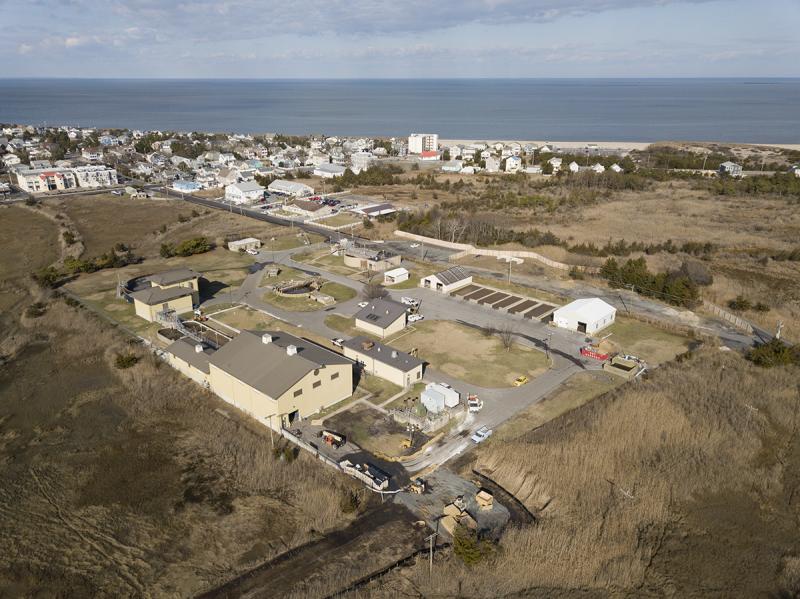Sussex County seeks partnership with Lewes BPW
Sussex County has approached the Lewes Board of Public Works with a partnership opportunity that could ultimately result in the demolition of the city’s wastewater treatment plant on American Legion Road.
Sussex is offering to accept all of the BPW’s effluent for treatment at its Wolfe Neck facility. Through the partnership, the county would send the treated wastewater back to Lewes for discharge at its outfall into the Lewes-Rehoboth Canal.
Lewes BPW officials held a public workshop March 31 to present the proposal to residents and customers. In addition to the county option, BPW officials also presented two other potential long-range projects for wastewater treatment operations.
One would be to bolster the existing wastewater treatment plant through upgrades over the course of several years. The other would be to build a whole new wastewater treatment plant in an area outside the floodplain.
Each option comes at a cost. Partnering with the county would cost about $6 million. The county has offered to pay for all the necessary infrastructure. The BPW’s expense would be to upgrade two pump stations and decommission the existing wastewater treatment plant.
Hardening the existing plant through a series of projects is estimated to cost about $20 million.
The most expensive option would be to build a new plant. If the BPW utilizes its existing outfall, the estimate is about $47.5 million. Setting up an ocean outfall would bring the project to about $88 million. Using a spray-irrigation land disposal approach would be about $77.5 million. Officials noted that one of the major challenges of building a new plant is finding the land for it.
BPW General Manager Austin Calaman noted all numbers discussed March 31 were rough estimates.
If the BPW chooses to partner with Sussex, BPW President Pres Lee said county officials are interested in moving forward immediately.
“They have [American Rescue Plan Act] money they’re planning to use to do any future improvements to their plant,” Lee said. The county received $45.5 million in ARPA funds. The money must be committed by 2024 and expended by 2026, so there is a sense of urgency from the county to begin to move forward with planning for the project.
The board was originally planning to do a long-range study. Anything that would’ve come out of that would be done over a number years, Lee said.
“We’re not ready to move forward with it immediately,” he said. “But over the next many years, we would harden the plant to make sure it was capable of withstanding major storms and the potential of sea-level rise flooding.”
There has been much discussion in recent years about the plant’s susceptibility to flooding. During one recent storm, American Legion Road – the only road to the plant – was completely submerged.
The plant is considered susceptible to flooding at an elevation over 9.5 feet. The current 100-year floodplain level is 7 feet for that site.
“The plant immediately is not at risk from flooding from storms,” said Tom Panetta, BPW board secretary. “The facility as it exists right now is at low risk, and we’re looking at the long-term issues here.”
One of the unknowns is how a partnership with the county would affect BPW customers’ rates. Panetta said discussions so far have centered around upfront capital costs to improve the county’s Wolfe Neck facility.
“The county would bill us for the routine operation of the Wolfe Neck plant for our prorated portion of it, and we have no idea what those numbers are right now,” he said.
When asked if rates would increase if the BPW borrowed $88 million to build a new plant, Lee said, “I would think so.”
Although BPW’s wastewater would be treated at a county facility, BPW operations would remain in Lewes. The BPW would still maintain its pump stations and infrastructure, and continue to bill and collect from customers.
Resident Paul Townsend said a partnership with the county could be a win-win if the BPW negotiates a solid agreement.
“Having run a wastewater treatment plant before, the best day of that was not running it anymore – there’s always something,” he said. “Wastewater treatment plants are strange animals, and if you can get out from underneath one, my suggestion is you wholeheartedly do it.”
He said having large storage lagoons available for emergency situations is not to be taken lightly.
“People still flush. Wastewater still comes in. Where does it go?” he said. “A lot of these small towns have the same problem. But if you go with [the county], you’ve got some serious lagoons.”
Following the major failure at the treatment plant in late 2019 and early 2020, the BPW spent $1 million to replace the facility’s filter membranes. During the event, the BPW was forced to partially treat effluent before dumping it into the marsh adjacent to the plant. Due to the facility’s age, BPW officials say other plant upgrades will be necessary in the near future.
Resident Barbara Curtis said she’s wary about partnering with the county. She pointed out that county officials first sought to utilize the ocean outfall in Rehoboth Beach, but city officials declined.
“So now they’ve come to Lewes,” she said.
The county is responsible for so much overdevelopment in the area, she said, and granting them access to the city’s outfall would allow for even more.
“They want to get rid of all the farmland. They want to congest our highways even worse than they are now,” Curtis said. “If no one gives them an outfall, hey, maybe things will get manageable around here. I think that’s worth considering.”
Earl Webb, BPW’s board treasurer, said that’s a fair perspective, but he believes the county has other options.
Panetta agreed.
“I know that people think that we can constipate them by not taking the sewage,” he said. “It’s not going to change the decisions at the county level. They county has alternative means they can go to.”
If the BPW declines the offer, Lee said, the county would likely pump wastewater out to its Long Neck facility, where it has about 2,000 acres for spray irrigation.
Resident Sam Martin said he has concerns about outsourcing treatment to the county.
“You’re relinquishing your control, which in a lot of cases in the long run turns out to be not so beneficial,” he said. “At least in Lewes the way it is now, we have control. We know the risks. We know where the skeletons are.”
Resident Stephanie Tsantes said she does not have any confidence that the BPW will retain any control if it works with the county.
“I’m afraid that we will be footing the bill for the continued growth in the county,” she said. “I don’t have a lot of confidence that the county is going to do it right, and do it right over the long haul. I would hate to see us give up what I think is basically a clean discharge on a hard-earned permit on a plant that was built with a lot of thought.”
No decisions have been made. The purpose of the meeting was to get feedback from residents and customers. Discussions will continue in the coming weeks.
A copy of the BPW’s presentation can be found at lewesbpw.com/events/wwtp-workshop.
Nick Roth is the news editor. He has been with the Cape Gazette since 2012, previously covering town beats in Milton and Lewes. In addition to serving on the editorial board and handling page layout, Nick is responsible for the weekly Delaware History in Photographs feature and enjoys writing stories about the Cape Region’s history. Prior to the Cape Gazette, Nick worked for the Delmarva Media Group, including the Delaware Wave, Delaware Coast Press and Salisbury Daily Times. He also contributed to The News Journal. Originally from Boyertown, Pa., Nick attended Shippensburg University in central Pennsylvania, graduating in 2007 with a bachelor’s degree in journalism. He’s won several MDDC awards during his career for both writing and photography. In his free time, he enjoys golfing, going to the beach with his family and cheering for Philadelphia sports teams.






















































